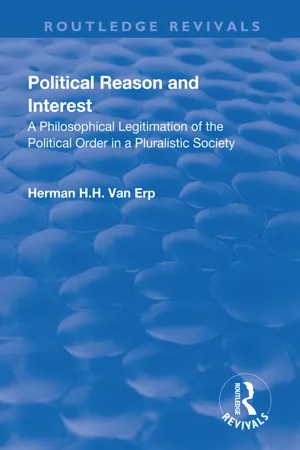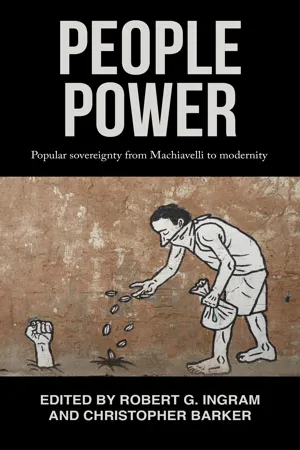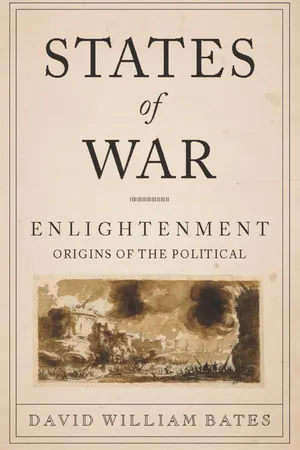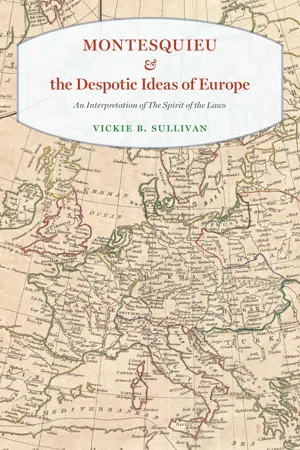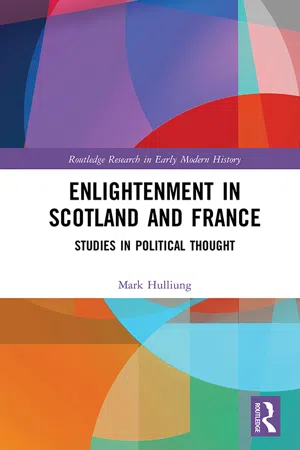Politics & International Relations
Montesquieu
Montesquieu was a French political philosopher known for his theory of the separation of powers, which greatly influenced the development of modern political systems. In his influential work "The Spirit of the Laws," he argued for a system of checks and balances to prevent the concentration of power in any one branch of government. Montesquieu's ideas continue to shape political thought and the structure of governments worldwide.
Written by Perlego with AI-assistance
Related key terms
7 Key excerpts on "Montesquieu"
- eBook - ePub
- Pierre Manent, Rebecca Balinski(Authors)
- 2019(Publication Date)
- Princeton University Press(Publisher)
CHAPTER V Montesquieu and the Separation of PowersI N GOING FROM Hobbes and Locke to Montesquieu we change worlds. Montesquieu’s political intentions remain essentially the same as those of Hobbes and Locke, but the means chosen for realizing them, and the language in which they are described, are radically different.The political intention remains the same: the end of the political institution is to ensure the security of persons and goods. The more certain the security, the more recommendable the institution. But the need for individual self-preservation is no longer strictly speaking the foundation of political legitimacy, of an absolute and incontestable legitimacy. Whereas Hobbes and Locke spoke the language of absolute rights—the individual’s or the sovereign’s—Montesquieu abandons this language and reestablishes on new bases the flexibility of the ancient politics. For example, Locke considered absolute monarchy to be not only a bad and illegitimate regime, but in fact not a political regime at all. It left men in a state of nature worse than the original one. Montesquieu, in contrast, considered the defects and merits of the French monarchy with equanimity. The French monarchy’s principle of legitimacy was radically illiberal, but its effective functioning assured tolerable liberties. In short, Montesquieu’s liberalism is not aggressive like Locke’s; he is liberal not only in his principles, but also in his mood or tone. If he was able to abandon the Lockean “absolutist” language, it is because he managed to found liberty on bases other than the concepts of the state of nature and sovereignty.The doctrine of sovereignty was both the salvation and the bane of early modern political thought. It saved it by making possible the conception of a neutral power, superior in principle to all interests and passions that drive men to war, whether political or religious. Sovereignty was responsible for constituting a human world invulnerable in principle to religion’s power. The bane was that, by constructing a power capable of imposing peace, one simultaneously raised a power capable of making war on its subjects. Of course, Locke attempted to make it impossible for the absolute sovereignty to turn against citizens by placing it in a legislative assembly representing their desire for preservation. But what if this assembly betrays its mandate, becomes oppressive? Then, says Locke, the only recourse is to appeal to Heaven—to rebel. This recourse is always open since the people are the ultimate source of all legitimacy.1 - eBook - ePub
Political Reason and Interest
A Philosophical Legitimation of the Political Order in a Pluralistic Society
- Herman H.H. van Erp(Author)
- 2018(Publication Date)
- Routledge(Publisher)
161Montesquieu’s trias politica involves both the separation and the distribution of power. If he were aiming at a true separation of power, his theory would be diametrically opposed to Hobbes’s theory of sovereignty which states that the highest power is indivisible because a division of power would detract from the power.162 While Montesquieu is concerned with protecting the freedom of the citizens against unbridled state power, his intention is not to attenuate the state’s power by dividing it among the different state institutions. The various powers should not be in opposition to each other as this would obstruct the state’s activities. The ideal is a dynamic equilibrium, the establishment of a harmony between the different powers of the state.163 ‘Sharing’ of power is more descriptive than ‘division’ of power.In no constitution is the division of power taken to such an extreme that the different powers are exclusively allocated to precisely demarcated state institutions. In the Netherlands legislation cannot be enacted without the co-operation of the government while justice is sometimes administered at executive level. Besides, legislation is often effected by lower authorities where the trias politica is realised only to a limited extent. It is also unavoidable that the judiciary sometimes acts as legislator. Legislation is never watertight. It is therefore highly unlikely that the different powers can be prevented from encroaching on each other’s territory as they jostle to demarcate their separate authorities. Precise limits of the powers cannot be determined and constitutionally established. It is by no means evident that a strict constitutional division of powers is a realistic goal. According to Hegel, Montesquieu’s brilliance lay in his recognising the power of the state as a unit consisting of separate elements. An emphasis on the division of power implies that state power needs to be kept in check.164 - eBook - ePub
- Ritchie Robertson(Author)
- 2020(Publication Date)
- Harper(Publisher)
He was also an active member of the Academy of Bordeaux, which was especially concerned with research in natural science. After resigning from the Parlement Montesquieu travelled extensively in Italy, Germany and England. Besides some short essays, he was the author of two brilliant and strikingly dissimilar books: the novel Persian Letters (1721) and the historical sketch Considérations sur les causes de la grandeur des Romains et de leur décadence (Considerations on the Greatness and Decline of the Romans, 1734). Thereafter he devoted himself to an ambitious work that would draw on his legal knowledge, his classical studies, his extensive reading of travel literature, and his experience of foreign states – particularly of the liberty he had found in England. The Spirit of the Laws is not a work of jurisprudence. It deals rather with the political, cultural and geographical constraints which a legislator must take into account when framing laws. ‘Many things govern men: climate, religion, laws, the maxims of the government, examples of past things, mores, and manners; a general spirit is formed as a result.’ 8 This general spirit, which will be different in each nation, rests in turn on what Montesquieu calls laws of nature and which we might call basic human needs, such as the need to defend oneself, the need to eat, the need for sexual reproduction, and the need to live in society. 9 The scope of legislation is defined by the form of government. Montesquieu distinguishes three. Where Aristotle had distinguished rule by the many (democracy), the few (aristocracy) and the one (despotism), Montesquieu classifies democracy and aristocracy as subtypes of republican government; adds monarchy, which he says the ancients did not understand; and makes despotism the third form. 10 In a republic, the people govern: either directly, as in the ancient republics, where all the citizens gathered in the marketplace to vote; or mediately, through an aristocracy - eBook - ePub
People power
Popular sovereignty from Machiavelli to modernity
- Robert Ingram, Christopher Barker(Authors)
- 2022(Publication Date)
- Manchester University Press(Publisher)
Many scholars have thus argued that Montesquieu was decisively opposed to the modern theory of sovereignty. 4 On the other hand, Montesquieu’s depiction of England is notoriously strange and ambiguous, and in his account of most other regimes, including his native France, there does seem to nearly always be a unitary sovereign. This has led other scholars to question the interpretation of Montesquieu as a critic of sovereignty. 5 In this chapter, I aim to settle the debate over Montesquieu and sovereignty. I will argue, first, that Montesquieu articulated a coherent theory of sovereignty, and, second, that it was a theory of profound historical significance. Montesquieu should be a far more important figure in narratives about the rise of sovereignty than he currently is. Montesquieu’s contribution, I will argue, was to articulate a theory of limited sovereignty – a theory in which the sovereign, even though the highest power in state, is not above the law. This may sound contradictory. If being sovereign means anything, does it not mean having the absolute power to do what one wants? Isn’t that what we mean when we say, for instance, that the people is sovereign? It is the presumption that sovereignty is equivalent to absolute power, and that this is what the seventeenth-century jurists argued, which has led to the widespread notion that Montesquieu must have rejected sovereignty. Yet in addition to the theory of absolute sovereignty that was developed by Hobbes and Bodin, the early modern period also saw the emergence of ideas about limited sovereignty - eBook - ePub
States of War
Enlightenment Origins of the Political
- David Bates(Author)
- 2011(Publication Date)
- Columbia University Press(Publisher)
18The implication is clear: the system is not animated by a genuine unity of purpose (as in normal states), a purpose that must be protected against the inevitable corruption of individuals or corporate bodies responsible for its execution. In England, unity is only an accidental production of a rather monstrous chain gang (itself an invention of the eighteenth century, incidentally). “The form of these three powers should be rest or inaction. But as they are constrained to move by the necessary motion of things, they will be forced to move in concert” (405/164). This circuit of powers in the English constitution is necessary because the society has not committed to one single site of sovereignty that would in turn be protected by a division of constitutional functions.19 As several astute commentators have noted, Montesquieu nowhere speaks of the separation of powers but instead of their distinction from each other. The separation idea is a largely legal one, developed in twentieth-century jurisprudence.20 For Montesquieu, the identification of powers was a political problem—where was power actually located, how are powers related to one another, and how could these powers best serve the interests of the society as a whole?It is obvious that in England alone, law itself becomes a kind of “power,” which has surely complicated the reception of Montesquieu’s thinking about constitutionality in Spirit of the Laws . Law assumes a special position in this nation precisely because what law usually articulates (the sociopolitical order of a sovereign structure) is absent here. Unlike the communities founding their political unity in the crisis of war, England lacks this solidarity of citizenship. “As each individual, always independent, would largely follow his own caprices and fantasies, he would often change parties; he would abandon one and leave all his friends in order to bind himself to another in which he would find all his enemies; and often, in this nation, he would forget both the laws of friendship and those of hatred” (XIX, 27, [575/326]). As Montesquieu clearly puts it, “The men in this nation would be confederates [confédérés ] more than fellow citizens [concitoyens - eBook - ePub
Montesquieu and the Despotic Ideas of Europe
An Interpretation of "The Spirit of the Laws"
- Vickie B. Sullivan(Author)
- 2017(Publication Date)
- University of Chicago Press(Publisher)
Leviathan and its related teachings with which Montesquieu agrees. Like Hobbes, Montesquieu endeavors to incline human beings to a type of peace; he teaches that the chaos of the state of war induces them to seek the haven of positive law; he reveals that human beings in society possess the most dreadful capacity to harm others. In addition, he certainly supports a gentler and more pleasing way of life for humanity, which could be characterized as commodious living, as well as the human industry that makes it possible.Despite these key areas of agreement, there is a still fundamental political disagreement between the two thinkers. Hobbes’s Leviathan contains the most powerfully elaborated case for a type of sovereignty that has become known as absolute.8 Montesquieu’s own homeland also produced, in the generations that immediately preceded his, formidable theorists of absolutism. During the reigns of Louis XIII and Louis XIV, Cardin Le Bret, Cardinal Richelieu, and Jacques Bénigne Bossuet wrote to abet the cause of absolute monarchy in France. Montesquieu does not directly engage in these particular controversies regarding the character of the contemporary French monarchy in The Spirit of the Laws, although he does offer particularly harsh but isolated criticisms of Richelieu, which explicitly link the aims of this minister and author to despotism. Despite Montesquieu’s general restraint on these issues that relate directly to his homeland, scholars have scrutinized his treatment there of monarchy and despotism in light of these French controversies and drawn differing conclusions regarding his ultimate position on them.9 Although he largely refrains from engaging with such controversies in this work, he indicates in his private notebook that Hobbes’s thought exercises a lingering ill effect on the French monarchy under which he lived as an adult: “It is the abbé Dubois who had spoiled the [regent] Duke of Orleans and had him reading Hobbes and other books of this type.”10 Thus, Montesquieu himself acknowledges privately that Hobbes’s writings can have an adverse effect on politics in general and on the monarchy of his homeland in particular. To attack the aspects of Hobbes’s thought that the French monarchy and its ministers have embraced in the service of an absolute monarchy, then, would be tantamount to a criticism of the French government. Therefore, Montesquieu’s understanding that Hobbes’s teaching was still associated with the monarchy of his own time would make the Englishman’s positivism and his depiction of the state of nature fitter aspects for explicit attack than his depiction of all-powerful rule. Montesquieu does note, after all, that “in extremely absolute monarchies, historians betray the truth because they do not have the liberty to tell it” (19.27, 333).11 - eBook - ePub
Enlightenment in Scotland and France
Studies in Political Thought
- Mark L. Hulliung(Author)
- 2018(Publication Date)
- Routledge(Publisher)
The centerpiece of Montesquieu’s study is his model of monarchy, presented with France foremost in mind. “Under monarchy the prince is the source of all power, political and civil,” 11 Montesquieu remarked, which is to say, he made clear he was speaking of absolute monarchy. Surrounding the king, obstructing the direct expression of the royal will are “intermediary powers,” clerical and noble; together, the king and intermediary bodies constitute the “nature” of the regime in Montesquieu’s parlance. What he calls its “principle” is the code of honor that the nobles have carried with them from provinces to court. France is a monarchical polity combined with an aristocratic society. However great their defects, the monarchies of the West are preferable to those of the Eastern world where there are no intermediary bodies to offset the capricious desires of the prince; where all claims to property may be overturned at any moment at the whim of the despot; and where “fear” is the “principle” of the regime. Despotic government destroys all social ties; it is a political regime that creates the equivalent of a Hobbesian state of nature. France is absolutism hindered by feudalism; Turkey absolutism unhindered. So long as France remains an absolute monarchy, it is imperative that the intermediary bodies be left intact. Voltaire spoke out against Montesquieu, accusing him of being an apologist for the intermediary bodies. Had he read Montesquieu with any care he would have realized that the Spirit of the Laws is highly critical of the Old Regime
Learn about this page
Index pages curate the most relevant extracts from our library of academic textbooks. They’ve been created using an in-house natural language model (NLM), each adding context and meaning to key research topics.

